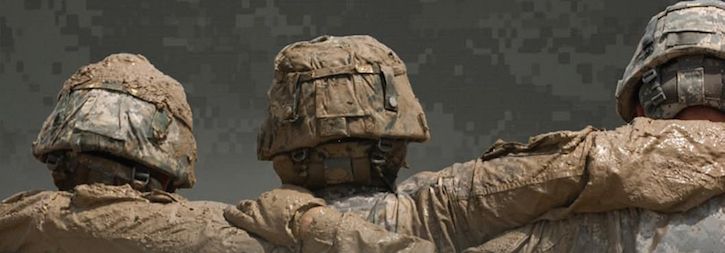- Politics
- Diversity, equity and inclusion
- Financial Decision Making
- Telehealth
- Patient Experience
- Leadership
- Point of Care Tools
- Product Solutions
- Management
- Technology
- Healthcare Transformation
- Data + Technology
- Safer Hospitals
- Business
- Providers in Practice
- Mergers and Acquisitions
- AI & Data Analytics
- Cybersecurity
- Interoperability & EHRs
- Medical Devices
- Pop Health Tech
- Precision Medicine
- Virtual Care
- Health equity
Veterans Are Active on Facebook. But Not When They Need Help.
How can healthcare leverage technologies and social networking to care for veterans in need?

Image has been resized. Courtesy of US Army.
In battle, soldiers trust each other with their lives, but when they come home, many find it hard to trust others with their feelings.
The suicide rate for veterans in America is 22% higher than that of civilians, yet seeking help for mental health issues is still stigmatized in the military’s warrior culture. A team of researchers at the Oregon Health and Science University thought that veterans might be turning to social media for help, so it studied how US Department of Veterans Affairs programs could meet troubled service members where they were at. The results, however, weren’t what the researchers expected.
The study, which was funded by a grant from the VA and recently published in JMIR, surveyed 270 military veterans who self-identified as probably having major depression. Researchers then homed in on the 162 veterans who were regular Facebook users, trying to find a way to extend the VA’s existing mental health programs to the people actually at risk.
“My experience is that the VA is a great healthcare system, but it’s often difficult for veterans to navigate,” Alan Teo, MD, the study’s lead author, told Healthcare Analytics News™. “I wanted to be more creative about connecting veterans to mental healthcare.”
Teo, who teaches at OHSU and serves as a staff psychiatrist and core investigator for the Portland, Oregon branch of the VA, initially thought that veterans recruited for the study would be more likely to reach out for help through the social network.
“Most everyone using Facebook was actually extremely unlikely to turn to Facebook if they were having an emotional problem or if they were experiencing suicidal thoughts,” Teo said. “This was the opposite of what I was expecting. We said, ‘God, could we have screwed up? Is this really accurate?’”
So they ran the data again, isolating for the most Facebook-active respondents. And yes, Teo said, even the guys who spent all day posting online wouldn’t turn to the network when they were struggling.
Instead, the data suggest that veterans favor seeking formal help over any other outlet, although some were receptive to looking to informal networks, like their close personal friends and family or phone hotlines. Teo said veterans may see those outlets as more trustworthy than the semi-public forum of their Facebook friends.
“We know that our Facebook friends are not the same as our real-life friends,” Teo said. “Facebook is much broader. When a vet is thinking about posting on Facebook, they’re thinking, ‘Do I really want my 466 or whatever Facebook friends to see this?’”
The VA’s mental health programs have been plagued by staff and budget shortages for years, and Teo’s survey shows that there isn’t an easy social-media fix to get veterans into the system.
“I would hope that these results could help inform the decision makers and policy makers in the VA to say that we do need to continue to invest significant resources into the more traditional modes of getting care,” Teo said. “We need to invest in the clinics and in the psychiatrists and psychologists and having access in VA hospitals and clinics.”
But there could still be some use for social networking platforms. Teo said that while veterans are unlikely to reach out for help on Facebook and other networks, many respondents were quick to acknowledge they were struggling in the right forum, usually when given some form of anonymity. “But when it comes for reaching out for help you’re no longer anonymous,” he said.
Teo said that an ideal system would find a way to link Facebook’s power to reach veterans with a safe, private way to direct them to traditional care. But until then, he wouldn’t rely on an at-risk veteran updating their status when they’re in need, as so many of them are.
Podcast: Match Made in Hospitals — Patient-Matching Technology Can Improve Healthcare
September 21st 2021Clay Ritchey, CEO of Verato, highlights the administrative and financial benefits that patient-matching technology can provide hospitals and health systems, as well as how it can improve the patient experience.
Podcast: Using Digital Solutions to Address Technology Shortfalls with Citius Tech Senior VPs
July 29th 2021In an interview recorded earlier this year, Chief Healthcare Executive Associate Editorial Director Mary Caffrey spoke with 2 leaders of Citius Tech about meeting healthcare challenges with digital solutions.
